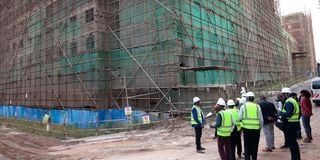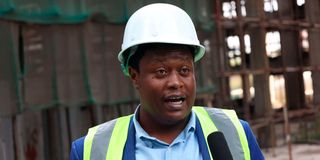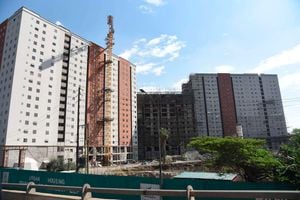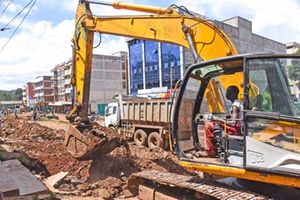
Construction at Jeevanjee Estate Project in Ngara, Nairobi on November 4, 2024.
A company contracted by the government to build affordable houses at Jeevanjee Estate in Ngara (not to be confused with Jeevanjee Gardens) has said the Nairobi County government has handed over the land, which is no longer public property.
Jabavu Village Limited confirmed that it secured a Sh1.9 billion loan from the National Bank of Kenya using the title deed of Jeevanjee Estate as one of the securities and has since withdrawn Sh450 million.
The developer said the government was supposed to provide land to builders under the affordable housing project, which saw Nairobi County transfer ownership of the land to a Special Purpose Vehicle (SPV) majority owned by Jabavu Village Limited.
Through its lawyer, Calvin Oira, the developer said the title deed, which was originally owned by the Nairobi City County government, was transferred in July 2019 to the SPV, which is controlled by the developer and the county.
“Since the title was transferred to the SPV where Jabavu Limited is 80 percent shareholder and Nairobi City County Government owns 20 percent, it cannot be said to be public land truthfully speaking. The higher shareholding of Jabavu Limited in the SPV is because we had invested funds in the development,” explained Mr Oira during a tour of the project on November 4.

Calvin Oira, the lawyer for Jabavu Village Limited, speaks to journalists at the Jeevanjee Estate Project site in Ngara, Nairobi on November 4, 2024.
In the signed agreement, Jabavu claimed 80 percent of the project while the county only took 20 percent.
In addition, the developer claimed that it was not appropriate to consult the Nairobi City County Government on how to raise the money for the project, including the Sh1.9 billion, since the agreement was clear that the county was only to provide the land for the project as the source of the money.
“In order to finance the project, Jabavu sought financing from the bank. The total banking facility is Sh1.9 billion and Jabavu Village has drawn down Sh450 million against the work certificates. Payments are done directly to the contractors and supporting consultants,” the lawyer explained.
The ownership of the Jeevanjee Estate land became a bone of contention between the developer and the Nairobi County Assembly's Departmental Committee of Urban Planning, which went to the National Bank to stop it from transacting any business using the title deed.
The county had said that in 2018, the title deed for Jeevanjee Estate was registered in the name of Nairobi City County, which was taken by former Nairobi governor Mike Sonko, who later denied the allegations.
While the developer claims that the title deed belongs to the SPV as per the agreement, the county insists that it owns the land and that the ownership was tampered with to defraud investors and the county.
Both the developer and the managing director of the National Bank are expected to appear before the County Assembly's Urban Planning Committee on November 6 to set the record straight.
Following an outcry from residents concerned about the slow progress of the construction of the new houses, Jabavu Village Limited sought to provide an update on the status of the project.
The real estate developer admitted that the project had been stalled for some time due to the process of sourcing materials from China, among other factors affecting the global market.
The outbreak of the Coronavirus pandemic in 2020, which originated in China, was cited as one of the reasons why the company delayed the project for about two years as it was unable to ship construction materials from China in time.
“The construction of the project is still on course, despite initial delays caused by acquisition of the land for construction, the Covid-19 pandemic and the sharp increase in steel prices following the Ukraine war,” said Mr Oira during the media address on the ground, where he confirmed that the project was about 50 percent complete.
The developer had initially planned to complete the entire project by the end of 2026, but has assured the residents who bought the houses that they will be able to occupy their houses before the end of 2025, after the delivery of materials that were delaying the process.
Mary Ariviza Mwami is one of the residents who invested her entire retirement savings in the Jeevanjee Estate project, but the long wait has forced her to live in a rented house for more than seven years.
With a dream of owning an affordable two-bedroom house just a ten-minute drive from the Nairobi CBD, Ms Ariviza says they have waited enough and with the high cost of living, some of them have been pushed and are struggling to cope with the reality of life.
“We had a lot of expectations that by now we should be inside the house and not paying rent elsewhere. They have said that they will leave the compound by December 2025. God willing we are going to be alive and we will come to check because we have been given these dates and then they keep pushing them ahead,” said Ms Ariviza.
She invested Sh2.5 million in the project, which means that she has paid in full, and is waiting to get the key to her two-bedroom house.
“I’m living in a rental house and [the cost is very] high now and some people are getting very upset and landlords are not on our side.”
The Jeevanjee project is expected to include 1,830 units of affordable and market housing, including 180 one-bedroom, 718 two-bedroom and 318 three-bedroom units. The market units include 350 two-bedroom and 264 three-bedroom units.










